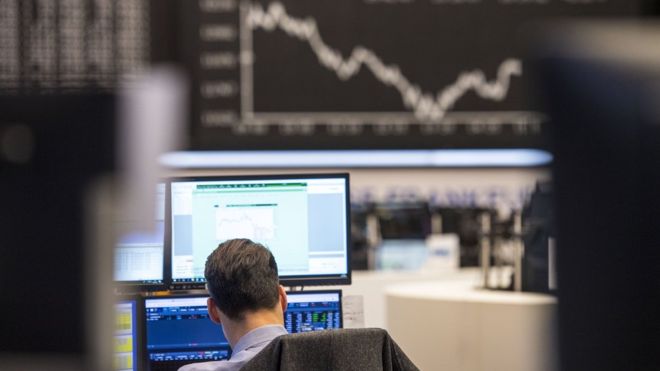Global stocks plunged on Monday and prices for crude oil tumbled as much as 33% after Saudi Arabia launched a price war with Russia, sending investors already panicked by the coronavirus fleeing for the safety of bonds and the yen.
Saudi Arabia had stunned markets with plans to raise its production significantly after the collapse of OPEC’s supply cut agreement with Russia, a grab for market share reminiscent of a drive in 2014 that sent prices down by about two thirds.
The shock in oil was seismic, with Brent crude LCOc1 futures sliding $12 to $33.20 a barrel in chaotic trade, while U.S. crude CLc1 shed $11.80 to $29.48.
European markets suffered hefty losses in early trade with London .FTSE dropping more than 8%, Frankfurt .GDAXI falling more than 7% and Paris .FCHI almost matching those losses.
The pan-regional STOXX 600 tumbled into bear market territory — a drop of more than 20% from recent peaks. Oil stocks suffered massive losses with Tullow (TLW.L) down 57% and BP (BP.L) down 27% in early trade.
In Asia, stocks and emerging market currencies with exposure to oil tumbled in volatile trade while the safe-haven yen surged.
Heavy selling was set to continue on Wall Street with U.S. futures EScv1 hitting their down limit.
Investors drove 30-year U.S. bond yields beneath 1% on bets the Federal Reserve would be forced to cut interest rates by at least 75 basis points at its March 18 meeting, after having already delivered an emergency easing last week.
“Wild is an understatement,” said Chris Brankin, Chief Executive at stockbroker TD Ameritrade Singapore.
“Not just us, but across the globe you would have every broker/dealer raising their margin requirements … trying to basically protect our clients from trying to leverage too much risk or guess where the bottom is.”
MSCI’s broadest index of Asia-Pacific shares outside Japan .MIAPJ0000PUS lost 4.4% in its worst day since August 2015, while Shanghai blue chips .CSI300 fell 2.9%.
Japan’s Nikkei .N225 dropped 5.1% and Australia’s commodity-heavy market closed down 7.3%, its biggest daily fall since the 2008 global financial crisis.
The number of people infected with the coronavirus topped 110,000 across the world as the outbreak reached more countries and caused more economic carnage.
Most of Italy’s stocks failed to open after the government ordered a lockdown of large parts of the north of the country, including the financial capital Milan.
There were also worries that U.S. oil producers that had issued a lot of debt would be made uneconomic by the price drop.
Not helping the mood was news North Korea had fired three projectiles off its eastern coast on Monday.
“After a week when the stockpiling of bonds, credit protection and toilet paper became a thing, let’s hope we start to see some more clarity on the reaction,” said Martin Whetton, head of bond & rates strategy at CBA.
“Dollar bloc central banks cut policy rates by 125 basis points, not as a way to stop a viral pandemic, but to stem a fear pandemic,” he added, while noting that many central banks had little scope to ease further.
Source: Reuters



